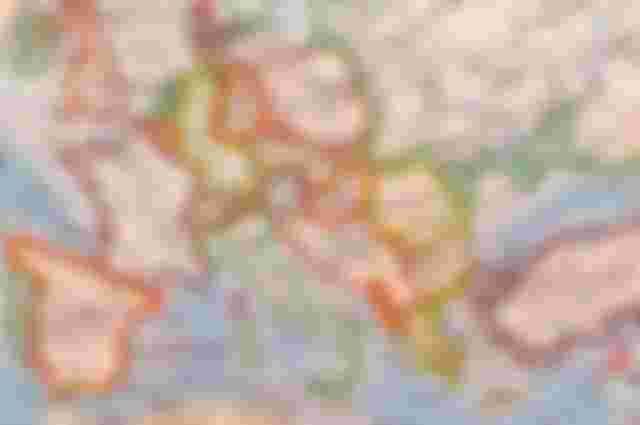The Borders of Europe
Where are the geographical borders around Europe? Is it possible to define the borderlines? Well, it is not as simple as one might wish.
Geographically, Europe is the area limited by the Arctic Sea in the north, The Mediterranean in the south, The Atlantic Ocean in the west - but the Eastern border is less clear. A bit vaguely, the Ural Mountains used to be considered as the Eastern border, or more specifically the Ural river or Emba river. Previously in history, the border was considered to be the river Don, or the Tanais river.
In reality it is unclear, whether the Ural area itself should be included in Europe or not. The Russians do include it, but Western Europeans usually do not.
In the Southeast the problem is obvious. From the Mediterranean to the east, the border follows the water through the Dardanelles, the Sea of Marmara, and the Bosporus, and into the Black Sea. Here comes the hardest part, between the Black Sea and the Caspian Sea. Sometimes it is drawn along the crest of the Caucasian mountains, sometimes along Kura river - and sometimes along one of the valleys north of the Caucasian mountains.
This leaves many unanswered questions. Russia is problematic, but is customarily counted to Europe, although the largest part of it lies in Asia. Cyprus, topographically, is a part of Asia Minor, but is almost always considered as Europe. Turkey, with only a very small part of its territory in Europe (the rest in Asia), is sometimes counted to Europe. When we come to the Caucasian countries (Georgia, Armenia, Azerbaijan), confusion grows further.
Personally I think Caucasus is Asia, not Europe - as are the Urals and Turkey. (And I don't think Turkey should be admitted into the European Union, simply for the reason that it is no European country; not geographically, not culturally, and not historically.)
This confusion leaves room for considerable variation on an organisational level, where Europe can mean many things. Let's look at some.

The Council Of Europe
Some people define Europe by membership of the Council of Europe. (This is not the European Union, although membership in the Council of Europe is a prerequisite for membership in the European Union.)
The members of the Council of Europe are (in the order of their accession):
Belgium, Italy, Sweden, Denmark, Luxembourg, United Kingdom, France, Netherlands, Republic of Ireland, Norway, Greece, Turkey, Iceland, Germany, Austria, Cyprus, Switzerland, Malta, Portugal, Spain, Liechtenstein, San Marino, Finland, Hungary, Poland, Bulgaria, Estonia, Lithuania , Slovenia, Czech Republic, Slovakia, Romania, Andorra, Latvia, Albania, Moldova, Republic of Macedonia, Ukraine, Russia, Croatia, Georgia, Armenia, Azerbaijan, Bosnia and Herzegovina, Serbia, Monaco, Montenegro.
Are there countries of Europe which are NOT members? Yes, Belarus and the Vatican City. While - in my opinion - Turkey, Georgia, Armenia, and Azerbaijan are clearly questionable.
The European Union
The European Union consists of:
Austria, Belgium, Bulgaria, Cyprus, Czech Republic, Denmark, Estonia, Finland, France, Germany, Greece, Hungary, Ireland, Italy, Latvia, Lithuania, Luxembourg, Malta, Netherlands, Poland, Portugal, Romania, Slovakia, Slovenia, Spain, and Sweden.
Candidates are:
Albania, North Macedonia, Montenegro, Serbia and Turkey.
Considered by the Union as "other European countries":
Andorra, Armenia, Azerbaijan, Belarus, Bosnia and Herzegovina, Georgia, Iceland, Liechtenstein, Moldova, Monaco, Norway, Russia, San Marino, Switzerland, Ukraine, Vatican City State and United Kingdom.
Not much to comment on, except the same reservation as before about Turkey and Caucasus.
The Union of European Football Associations
UEFA, The Union of European Football Associations, includes these members (apart from Europe proper):
Armenia, Azerbaijan, Cyprus, Georgia, Israel, Kazakhstan, Russia and Turkey, who have themselves chosen to belong to UEFA rather than the Asian Football Confederation. Cyprus could chose to be seen as European, Asian or African.
So in the world of football, Europe includes Israel and Kazakhstan!
The European Broadcasting Union
Have you ever wondered why Israel and Morocco can participate in the Eurovision Song Contest? They cannot by any definition be said to belong to Europe.
The Eurovision Song Contest is arranged by EBU, and only members may participate. Fully active Members of EBU, The European Broadcasting Union, are from states which are Members of the Council of Europe, or those from states that fall within the European Broadcasting Area.
The European Broadcasting Area includes, besides Europe proper, Western Russia, the Caucasus, and the Middle East down to Northern Saudi Arabia; including all the countries around the Mediterranean. This does include, for instance, Morocco, Algeria, Egypt, Jordan, Palestine, and Iraq!
So, EBU's Europe is quite large, and not in accordance with anyone else's!
Copyright © 2007, 2022 Meleonymica/Mictorrani. All Rights Reserved.
(Image by Mabel Amber/Pixabay, CC0/Public Domain.)
My articles on geography can be found here.
You find all my writings on Read.Cash, sorted by topic, here.
You can read here about the origin of the name “Europe”.
My 5 most recent articles:
The Seven Wonders of the World - Old & New Lists
Applied Privacy: The Value of False Trails & Contrary Information

From a purely Geophysical perspective,
"Europe" and "Asia" is all one giant landmass.
The only difference is purely politics and culture.
The only justification for a "European Union" and "Council of Europe"
is to alienate everyone else on the planet.
The term European then becomes just another global "Caste".
Anyone born outside that club is just an "other".
Which informs substantially about personalities who glorify "European".
Which also informs substantially about personalities who glorify "Asian".
All the rest of us who do not glorify 'geographical allegiance' are real people.